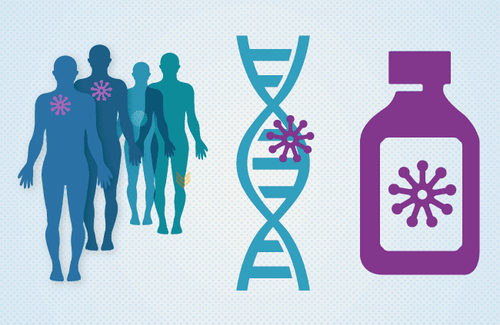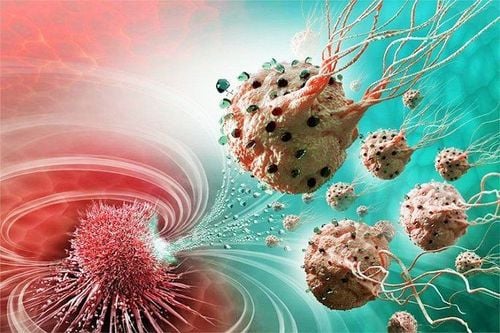This is an automatically translated article.
Posted by doctors at Oncology Department - Vinmec Time City International General HospitalTargeted cancer therapy is a method of treating cancer using drugs. Targeted therapy is different from traditional chemotherapy. This is a specific, targeted therapy that helps stop the growth and spread of tumors. They work by attacking specific genes or proteins.
1. Overview of targeted therapy?
Targeted therapy or molecular targeted therapy is one of the main modalities of medical treatment in cancer, alongside other therapies such as hormonal therapy and cytotoxic chemotherapy. As a form of molecular medicine, targeted therapy blocks the growth of cancer cells by interfering with "target" molecules needed for tumor formation and growth, unlike chemotherapy. Traditional therapy, only attacks all rapidly dividing cells (both tumor cells and healthy cells, so the patient suffers more toxicity). However, to increase the effectiveness of treatment, targeted drugs can be combined with chemotherapy or even combined in the same drug to maximize effectiveness.
Another form of targeted therapy is the use of enzymes applying nanotechnology to attach to tumor cells, triggering the body's natural cellular degeneration process, which can then be digested and eliminated. cells from the body effectively.
Targeted therapies in cancer treatment are expected to be more effective than older forms of treatment and cause less harm to normal cells. Many targeted therapies are based on the principles of immunotherapy (using immune mechanisms for therapeutic targets) developed by the field of oncology immunology. Therefore, as immunomodulators, they are a type of biological response modifier.
Ideally targeted therapies are drugs that can specifically target a protein or enzyme that carries a mutation that is specific to cancer cells and is not found in other normal cells of the body. One of the most successful targeted therapies is Gleevec, which is a kinase inhibitor with special affinity for the cancer protein BCR-Abl, which is the main protein that promotes tumorigenesis in leukemia. chronic marrow (CML). Other examples of targeted therapies targeting mutations in cancer include PLX27892 which intercepts the B-raf mutation in melanoma (a type of skin cancer).

Currently, targeted therapy has been developed and applied in the treatment of lung cancer, colorectal cancer, head and neck cancer, breast cancer, multiple myeloma, lymphoma blood (lymphoma), prostate cancer, melanoma, and other cancers.
To select patients who are likely to respond to a certain targeted therapy, physicians often have to test a number of biomarkers (markers) based on the patient's biopsy sample.
Co-targeted therapy involves the use of one or more therapies that target multiple targets, for example PI3K and MEK, in an attempt to produce a synergistic effect and prevent the development of drug resistance.
Experiments show that targeted therapy can reverse the malignant phenotype of tumor cells, as reported by Mark Greene et al. in 1985, he used monoclonal antibodies to fight malignant cells. have the Her2/neu transformation, turning them into healthy cells.
Trắc nghiệm: Thử hiểu biết của bạn về bệnh ung thư
Ung thư là nguyên nhân gây tử vong hàng thứ 2 trên thế giới. Thử sức cùng bài trắc nghiệm sau đây sẽ giúp bạn có thêm kiến thức về yếu tố nguy cơ cũng như cách phòng ngừa bệnh ung thư.
Bài dịch từ: webmd.com
2. Classification of targeted therapy
Currently, the two main types of targeted therapy are small molecules and monoclonal antibodies
2.1. Small molecules Most of its target is tyrosine-kinase, so this group of so-called tyrosine-kinase inhibitors
Imatinib (Gleevec, also known as STI–571) favorable in the treatment of chronic myeloid leukemia, gastrointestinal cancer and some other types. Gefitinib (Iressa, also known as ZD1839), targets the tyrosine kinase of the epidermal growth factor receptor (EGFR) and is approved for the treatment of non-small cell lung cancer (non-small cell lung cancer). small cell lung cancer) Erlotinib (trade name Tarceva). Erlotinib inhibits the epidermal growth receptor EGFR and acts through a mechanism similar to gefitinib. Erlotinib has been shown to improve survival in patients with metastatic non-small cell lung cancer when used in second line therapy. Sorafenib (Nexavar) Sunitinib (Sutent) Dasatinib (Sprycel) Lapatinib (Tykerb) Nilotinib (Tasigna) Bortezomib (Velcade) is a proteasome inhibitor that induces cancer cell death through interaction with many proteins. The drug is used in the treatment of multiple myeloma. Selective estrogen receptor modulators (tamoxifen) are also considered targeted therapy Janus kinase inhibitors such as tofacitinib ALK inhibitors such as crizotinib Bcl-2 inhibitors (such as obatoclax, navitoclax, and gossypol) PARP inhibitors (eg Iniparib, Olaparib) PI3K Inhibitors (eg perifosine) Apatinib is a selective VEGF Receptor 2 inhibitor that has initially shown anti-malignant activity in a variety of cancers. Apatinib is currently being tested in the treatment of metastatic gastric carcinoma, metastatic breast cancer, and advanced hepatocellular carcinoma. Zoptarelin doxorubicin (AN-152), doxorubicin linked to [D-Lys(6)]-LHRH, phase II trial in ovarian cancer. Braf inhibitors (vemurafenib, dabrafenib, LGX818) are used to treat metastatic melanoma with the BRAF V600E mutation. MEK inhibitors (trametinib, MEK162), often combined with BRAF inhibitors to treat melanoma. CDK inhibitors such as PD-0332991, LEE011 in clinical trials Hsp90 inhibitors are in clinical trials. Salinomycin has been shown to kill cancer stem cells in a mouse model of breast cancer. VAL-083 (dianhydrogalactitol), is a first generation DNA target. Clinical trials have demonstrated activity against several types of cancer including glioblastoma, ovarian cancer and lung cancer.

2.2. Monoclonal antibodies Pembrolizumab (Keytruda) binds to the PD-1 protein present on T cells. Pembrolizumab blocks PD-1 and helps the immune system destroy cancer cells. Used in the treatment of many types of cancer such as melanoma, Hodgkin's lymphoma, non-small cell lung carcinoma,... Rituximab targets CD20 present on B cells. in non-Hodgkin lymphoma Trastuzumab targets the Her2/neu receptor (also known as ErbB2) expressed on certain breast cancer cells. Alemtuzumab Cetuximab targets the epidermal growth factor receptor (EGFR). It is used in the treatment of metastatic colorectal cancer and squamous cell carcinoma of the head and neck. Panitumumab also targets EGFR. The drug is used in the treatment of metastatic colorectal cancer. Bevacizumab targets the circulating VEGF ligand. The drug is approved for the treatment of colorectal cancer, breast cancer, and non-small cell lung cancer and is being studied in the treatment of sarcoma. Applications in the treatment of brain tumors have also been started. Ipilimumab (Yervoy) In addition, various antibody-drug conjugates, Serine/Threonine kinase inhibitors or small molecule conjugates are other classes of targeted therapy that are continuing to develop.
Department of Oncology - Radiation Therapy of Vinmec system is focused on carefully investing in expertise and equipment, bringing satisfaction to patients.
The leading team of domestic and international doctors: the doctors are all highly qualified, experienced, conscientious and knowledgeable, having worked in major hospitals of Vietnam, Korea, Russia, are trained specialized training in the country and abroad to bring the most effective and new treatment regimens to patients. Intensive technique, effective treatment of difficult cases: is the first and only hospital in Vietnam to successfully deploy robotic surgery. CT scan accurately detects cancer even when there are no symptoms. Applying advanced gene technologies to early detect the risk of 16 most common cancers. Deploying autologous immunotherapy and thermotherapy in combination with cancer treatment to effectively prevent recurrence. Continuously working for the community: always accompanies the community in free screening programs for common cancers: Breast, cervical, colorectal, etc. Thousands of patients cannot be screened for cancer, join hands with the community to fight back the dreaded cancer. To register for examination and treatment with the leading doctors of the Department of Oncology - Radiation Therapy, please click the "Contact Us" button on the website, or register for an online examination HERE.
Please dial HOTLINE for more information or register for an appointment HERE. Download MyVinmec app to make appointments faster and to manage your bookings easily.













